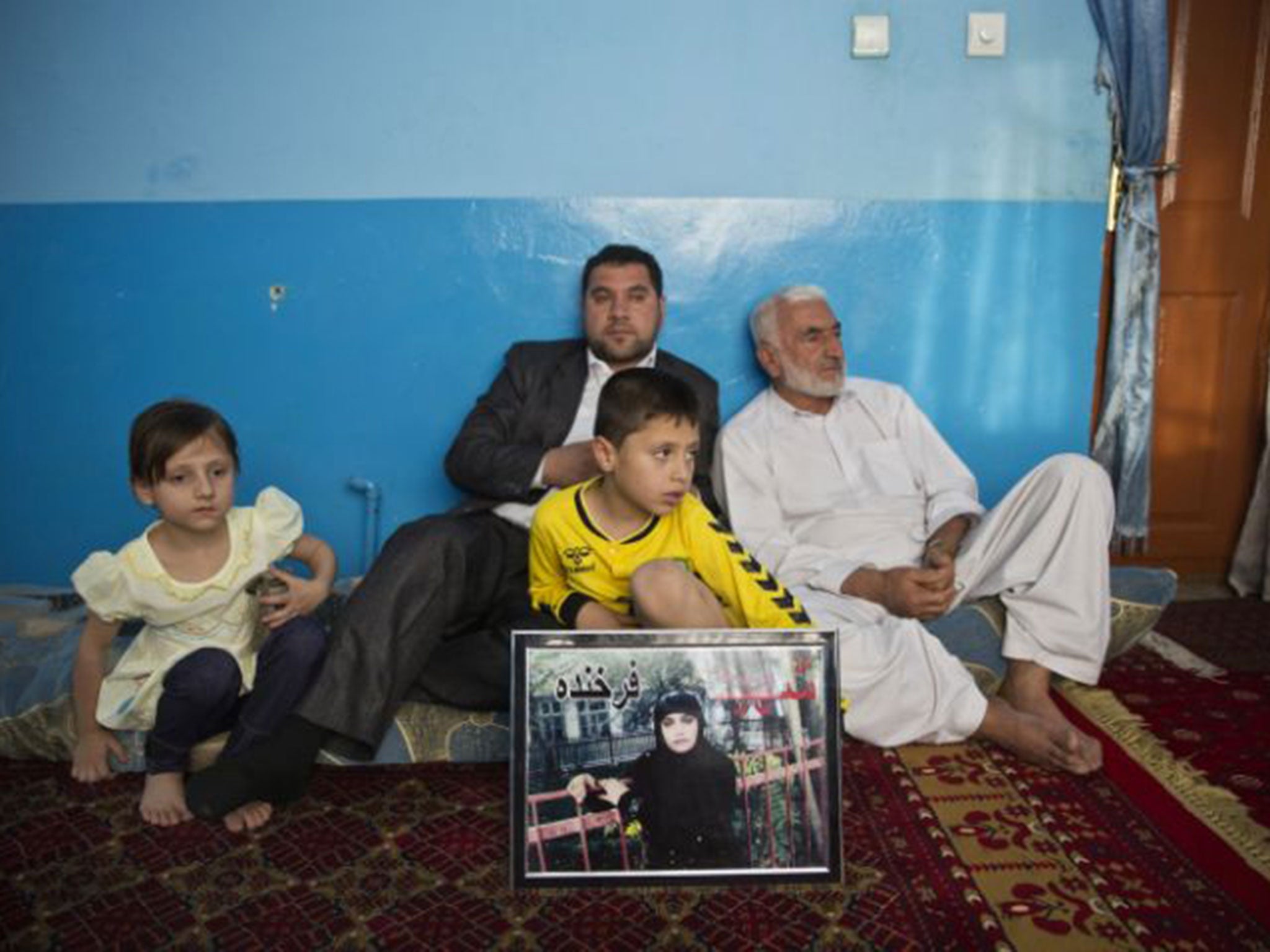Farkhunda Malikzada: Murdered Kabul woman's family afraid to leave house as killers are released
After a peddler at a Kabul shrine falsely accused Farkhunda of burning a Koran, a mob attacked her as police watched

Your support helps us to tell the story
From reproductive rights to climate change to Big Tech, The Independent is on the ground when the story is developing. Whether it's investigating the financials of Elon Musk's pro-Trump PAC or producing our latest documentary, 'The A Word', which shines a light on the American women fighting for reproductive rights, we know how important it is to parse out the facts from the messaging.
At such a critical moment in US history, we need reporters on the ground. Your donation allows us to keep sending journalists to speak to both sides of the story.
The Independent is trusted by Americans across the entire political spectrum. And unlike many other quality news outlets, we choose not to lock Americans out of our reporting and analysis with paywalls. We believe quality journalism should be available to everyone, paid for by those who can afford it.
Your support makes all the difference.The family of an Afghan woman killed by a frenzied mob in an attack that shocked the world with its brutality, are living in isolation and fear as they wait for justice they believe will never come.
Since Farkhunda Malikzada was killed in March, life has come to a standstill for those she left behind, said her father, 72-year-old Mohammad Nader Malikzada.
“We cannot live a normal life, our children cannot go to school or college, we can’t even go shopping,” he said. “We are under such psychological pressure. It is hell in this house.”
His despair was compounded this month when Afghanistan’s Primary Court released 37 of the 49 people convicted of Farkhunda’s murder pending their appeals against sentences the family has said are too light.
After a pedlar at a Kabul shrine falsely accused Farkhunda of burning a Koran, a mob attacked her as police watched. After punching, kicking and beating her with wooden planks, the crowd threw her from a roof, ran over her with a car and crushed her with a block of concrete. They then set her body alight on the bank of the Kabul River.
The killing fuelled widespread outrage. Protesters demanding rights for women and judicial reform carried posters showing Farkhunda’s bloody face and held candlelight vigils.
Fearing violence, kidnapping, or retribution from police or members of the mob who have been released, Farkhunda’s family – elderly parents and most of her seven sisters and two brothers, and their wives and children – rarely leave the house. The adults don’t go to work, and the children no longer go to school or university. “What will happen if the children cannot go to school? Will they be illiterate?” said Najibullah, Farkhunda’s 37-year-old brother.
Farkhunda’s mother, Bibi Hajira, said she feels their lives are in constant danger. “We want to see justice and we want to be moved to a safe place,” she said. “I don’t have power or money to fight for it.”
In the days after Farkhunda’s murder, family members met the First Lady Rula Ghani, who said the “horrible, barbaric tragedy” had highlighted how violent Afghan society has become.
At the murder trial, four people were found guilty and sentenced to death. Charges against 18 men were dropped for lack of evidence, and eight others were sentenced to 16 years in prison. Of 19 policemen charged with dereliction of duty, eight were acquitted due to lack of evidence, and 11 were sentenced to one year in prison. This month, the Appeals Court upheld a decision to release 37 defendants ahead of their appeals. “These decisions are completely unacceptable,” said Mohammad. “Anyone who witnessed this brutal killing of an innocent girl and stood by and did nothing – they are also guilty,” he said.
The family has retreated into their loss. “We don’t eat, we don’t sleep, we cry,” said Mohammad. “If at mealtime we remember that Farkhunda liked what we’re eating, we can’t eat any more.”
AP
Join our commenting forum
Join thought-provoking conversations, follow other Independent readers and see their replies
Comments